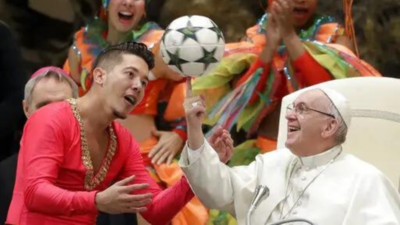‘Who am I?’ ‘: How Pope Francis fought for an inclusive church
Pope Francis, who died at the age of 88, will be remembered as a revolutionary Pontif Catholic Church In a more inclusive and compassionate institute. From embracing the poor and migrants to showing unexpected support to LGBTQ+ believers, their decade long sinners were defined by the desire to face centuries -old dogma and to face conservative opposition.
In 2013, Pope Benedict was elected after XVI’s historic resignation, Francis immediately indicated a change in tone. Rejecting the grandeur of Papal palaces, he chose to stay in a minor Vatican guesthouse room, called for “a poor church for the poor”. In the name of St. Francis of Ascea, the Argentina Pope brought humility and humanity to the sinner – and in doing so, both attracted praise and fierce resistance.
LGBTQ+ and Support for remarriage Catholic
Francis’s famous comment now, “Who am I?” In response to questions about gay Catholic, understood your open -hearted approach. Not changing the principle of the church on the same-sex marriage, he allowed blessings to the same-lingo couples and approved the baptism of transgender believers.
He took important steps towards welcoming divorced and remarriage Catholics, allowing him to get communian – a step that attracted the Ire of many traditionalists.
His support for marginal groups did not stop there. On his first Easter, he washed and kissed the feet of prisoners, including women and Muslims, in which the beginning of a sinner inherent in symbolic gestures of inclusion was marked.
Embrace of migrants and challenging power
Pope Francis regularly made the plight of migrants champions. His first foreign trip was from Lampedusa, where he condemned “globalization of apathy”. He later brought the Syrian Muslim refugee families back to Rome after a visit to Lesbos, and publicly criticized the border walls, including those proposed by Donald Trump.
He also condemned the global economic system that he believes the poor have been exploited. His 2015 encyclopedia “Lodato SI” linked economic injustice to environmental collapse, announcing that the Earth was becoming a “huge pile of dirt” under uncontrolled capitalism.
Francis’s economic and environmental messages praised him with progressives, but attracted allegations of Marxism from some American conservatives. He dismissed the label, saying, “I know many Marxists and they are good people.”
Improvement, resistance and heritage
Internal, Francis worked to deal with corruption and mismanagement within the Vatican. He improved the scam-prone Vatican Bank, opened archives for the civil court, and judged in a high-profile financial testing, resulting in the punishment of Cardinal Angelo Besiu.
He also tried to change the character of the church leadership, and replaced rigorous theorists with more rustic-minded figures. This led to a high-profile conflict with Cardinal Raymond Burke, a vocal critic that Francis eventually approved.
Although they refused to reverse the church in protest against abortion, contraceptive, or coordination of women, they appointed women in major Vatican roles and repeatedly called for a more kind church.





